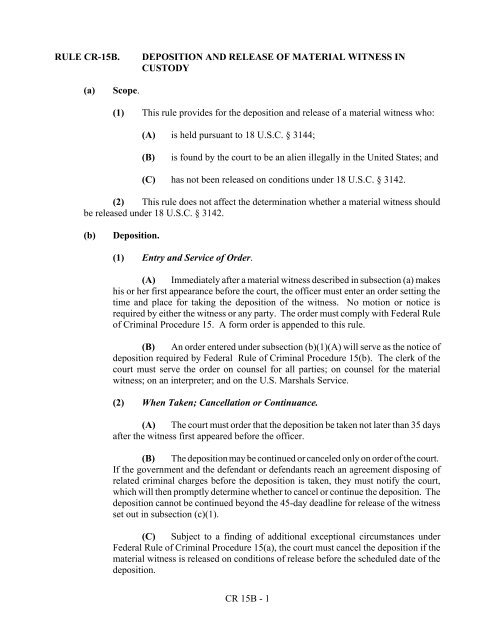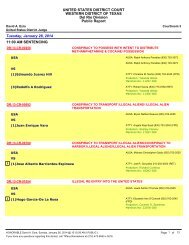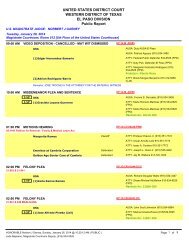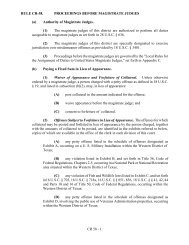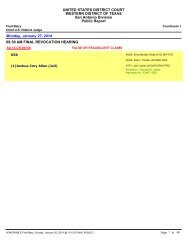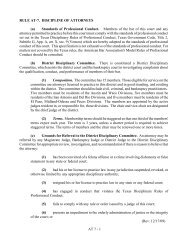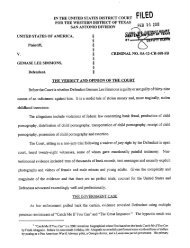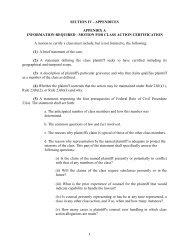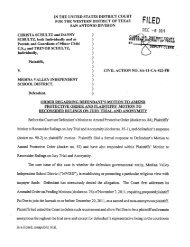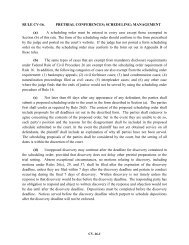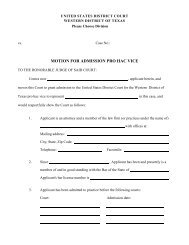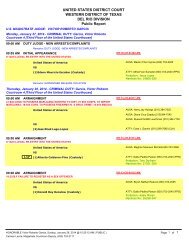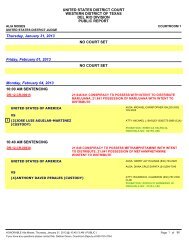RULE CR-15B. DEPOSITION AND RELEASE OF MATERIAL ...
RULE CR-15B. DEPOSITION AND RELEASE OF MATERIAL ...
RULE CR-15B. DEPOSITION AND RELEASE OF MATERIAL ...
Create successful ePaper yourself
Turn your PDF publications into a flip-book with our unique Google optimized e-Paper software.
<strong>RULE</strong> <strong>CR</strong>-<strong>15B</strong>.<br />
<strong>DEPOSITION</strong> <strong>AND</strong> <strong>RELEASE</strong> <strong>OF</strong> <strong>MATERIAL</strong> WITNESS IN<br />
CUSTODY<br />
(a)<br />
Scope.<br />
(1) This rule provides for the deposition and release of a material witness who:<br />
(A) is held pursuant to 18 U.S.C. § 3144;<br />
(B)<br />
is found by the court to be an alien illegally in the United States; and<br />
(C) has not been released on conditions under 18 U.S.C. § 3142.<br />
(2) This rule does not affect the determination whether a material witness should<br />
be released under 18 U.S.C. § 3142.<br />
(b)<br />
Deposition.<br />
(1) Entry and Service of Order.<br />
(A) Immediately after a material witness described in subsection (a) makes<br />
his or her first appearance before the court, the officer must enter an order setting the<br />
time and place for taking the deposition of the witness. No motion or notice is<br />
required by either the witness or any party. The order must comply with Federal Rule<br />
of Criminal Procedure 15. A form order is appended to this rule.<br />
(B) An order entered under subsection (b)(1)(A) will serve as the notice of<br />
deposition required by Federal Rule of Criminal Procedure 15(b). The clerk of the<br />
court must serve the order on counsel for all parties; on counsel for the material<br />
witness; on an interpreter; and on the U.S. Marshals Service.<br />
(2) When Taken; Cancellation or Continuance.<br />
(A) The court must order that the deposition be taken not later than 35 days<br />
after the witness first appeared before the officer.<br />
(B) The deposition may be continued or canceled only on order of the court.<br />
If the government and the defendant or defendants reach an agreement disposing of<br />
related criminal charges before the deposition is taken, they must notify the court,<br />
which will then promptly determine whether to cancel or continue the deposition. The<br />
deposition cannot be continued beyond the 45-day deadline for release of the witness<br />
set out in subsection (c)(1).<br />
(C) Subject to a finding of additional exceptional circumstances under<br />
Federal Rule of Criminal Procedure 15(a), the court must cancel the deposition if the<br />
material witness is released on conditions of release before the scheduled date of the<br />
deposition.<br />
<strong>CR</strong> <strong>15B</strong> - 1
(3) Discovery. The parties must exchange all required discovery reasonably in<br />
advance of the date of the deposition.<br />
(4) Location. Unless impracticable, the deposition should be taken in a court<br />
facility.<br />
(5) Attendance.<br />
(A) All parties and persons served under subsection (b)(1)(B) of this rule<br />
must attend the deposition, except that any defendant may waive attendance by filing<br />
a written waiver before the date of the deposition, in accordance with Federal Rule of<br />
Criminal Procedure 15(c)(1).<br />
(B) The U.S. Marshals Service must make available the witness and<br />
defendant in its custody, at the time and place of the deposition ordered by the court.<br />
(6) How Taken. The deposition must be recorded by videotape. The U.S.<br />
Attorney's Office must provide a videographer to record the deposition, and will bear the costs<br />
and expenses of taking the deposition. Other expenses will be borne by the parties, except as<br />
provided in Federal Rule of Criminal Procedure 15(d).<br />
(7) Review and Certification.<br />
(A) After the deposition is completed, the videotape recording must<br />
immediately be played back in the presence of the witness, the interpreter, and all<br />
parties attending the deposition, and their attorneys. Any corrections or modifications<br />
to the deposition must be recorded on the same videotape used to record the<br />
deposition, and should immediately follow the deposition on the recording.<br />
(B) The deposition must be certified consistent with Federal Rule of Civil<br />
Procedure 30, except as otherwise provided by this rule or ordered by the court. It is<br />
not required for certification that the videotape recording be transcribed.<br />
(C) The material witness and all interested parties may waive review and<br />
certification in writing, in accordance with Rule <strong>CR</strong>-15.<br />
(8) Custody of Deposition. The government must maintain custody of the<br />
videotape deposition and certification, or any waiver of certification. Upon request, the<br />
government must provide a copy of the deposition to the witness or any defendant.<br />
(9) Use as Evidence. The use and admissibility of the deposition are governed by<br />
Federal Rule of Criminal Procedure 15, the Federal Rules of Evidence, and applicable court<br />
precedent. The presiding judge should rule on any objections to the deposition at or before<br />
trial. Nothing in this rule relieves the proponent's burden of demonstrating the unavailability<br />
of the material witness under Federal Rule of Evidence 804(a).<br />
<strong>CR</strong> <strong>15B</strong> - 2
(c)<br />
Release.<br />
(1) Mandatory Deadline for Release. A material witness described in subsection<br />
(a) must be ordered released from the custody of the U.S. Marshals Service by the first to occur<br />
of the following deadlines:<br />
(A) within 24 hours of the taking, and the certification or waiver of<br />
certification, of the witness' deposition; or<br />
(B)<br />
within 45 days of the witness' first appearance before a court.<br />
(2) Earlier Release. If the deposition is canceled under subsection (b)(2)(B), the<br />
court should determine promptly whether to order the release of the material witness from U.S.<br />
Marshals Service custody.<br />
Committee Notes<br />
1. Rule <strong>CR</strong>-<strong>15B</strong> is a new rule that prescribes procedures for deposing and releasing material witnesses<br />
in custody. The Committee notes that there is a conflict between Appendix I and <strong>CR</strong>-<strong>15B</strong> in that the<br />
appendix, which likely was drafted with civil depositions in mind, imposes the cost of copies on the<br />
party seeking the copy whereas <strong>CR</strong>-<strong>15B</strong> requires the government to furnish copies to the witness and<br />
defendant upon request. This conflict is addressed by language on the form order.<br />
2. Notwithstanding subsection (b)(2)(B), the court may continue the deposition for "good cause." See<br />
Rule <strong>CR</strong>-1(e).<br />
3. Subsection (b)(3) does not provide for discovery other than that ordered by the court. The<br />
Committee contemplates that the parties will exchange information as would be required as if the<br />
witness were testifying at trial, including discovery required by Fed. R. Crim. P. 15(e), Fed. R. Crim.<br />
P. 16, and Fed. R. Crim. P. 26.2; statements covered by the Jencks Act, 18 U.S.C. § 3500; and<br />
impeachment information under Brady v. Maryland, 373 U.S. 83, 83 S. Ct. 1194 (1963), and Giglio<br />
v. United States, 405 U.S. 150, 92 S. Ct. 763 (1972).<br />
4. The use of an interpreter should accord with 28 U.S.C. § 1827 and applicable directives of the<br />
Administrative Office of the U.S. Courts. The government bears the burden of providing an interpreter<br />
for the deposition.<br />
5. The rule does not require a written transcript of the deposition but leaves to the court and the parties<br />
to determine whether a written transcript is necessary in any given case. The Committee notes that,<br />
unlike the U.S. Attorney and the Federal Public Defender, private counsel appointed under the Criminal<br />
Justice Act, 18 U.S.C. § 3006A, cannot obtain a written transcript without a court order. See 28 U.S.C.<br />
§ 1915(c). The proposed order appended to the rule provides that a Criminal Justice Act panel attorney<br />
may request a written transcript.<br />
<strong>CR</strong> <strong>15B</strong> - 3
Appendix to Local Court Rule <strong>CR</strong>-<strong>15B</strong><br />
UNITED STATES DISTRICT COURT<br />
WESTERN DISTRICT <strong>OF</strong> TEXAS<br />
SAN ANTONIO DIVISION<br />
UNITED STATES <strong>OF</strong> AMERICA, §<br />
Plaintiff,<br />
v. § <strong>CR</strong>IMINAL NO. __-__ -<strong>CR</strong>-__<br />
,<br />
Defendant(s). §<br />
ORDER SETTING <strong>MATERIAL</strong> WITNESS <strong>DEPOSITION</strong><br />
Before the Court is the matter of the taking of the deposition of material witnesses in the<br />
above-styled and numbered cause. The Court finds that ________ (names of material witnesses)<br />
are aliens not lawfully admitted to the United States, that they are material witnesses in the case<br />
styled United States v. (Name of Defendant, cause no.), being held pursuant to 18 U.S.C. § 3144,<br />
and that they have not been released on conditions pursuant to 18 U.S.C. § 3142. As such, the<br />
Court finds that this case presents "exceptional circumstances" and that the "interest of justice"<br />
requires the taking of the deposition of the material witnesses. Rule 15(a), Fed.R.Crim.P. The<br />
Court further finds that there will be no failure of justice if the material witnesses are released after<br />
their depositions have been taken and certified in accordance with 18 U.S.C. § 3144 and Local<br />
Court Rule <strong>CR</strong>-<strong>15B</strong>.<br />
IT IS THEREFORE ORDERED that the depositions of _______(names of material<br />
witnesses) are set for ____(date and time) at _______(place).<br />
IT IS FURTHER ORDERED that the depositions shall be recorded by videotape. The<br />
videotape must provide an electronic sound recording which is sufficient to comply with 28 U.S.C.<br />
§1827(d)(2). They also may be recorded by stenographic means at the party's own expense.<br />
Notwithstanding the foregoing, subsequent to the completion of the deposition, a CJA panel<br />
attorney may request that a stenographic transcript of all or part of a deposition. Each deposition<br />
shall be certified consistent with Rule 30, Fed.R.Civ.P. and Local Rule <strong>CR</strong>-<strong>15B</strong>, and shall be<br />
accomplished by the immediate playback of the videotape recording in the presence of the material<br />
witness, the interpreter, all parties attending the deposition, and their attorneys. Any corrections or<br />
modifications to the deposition shall be recorded on the same videotape, following the recording of<br />
the deposition. Playback of the recording and certification may be waived in writing in accordance<br />
with Local Rule <strong>CR</strong>-15A. The government shall retain custody of the videotape depositions and<br />
written statements of certification or waiver of certification pending trial. Notwithstanding<br />
Appendix I to the Local Rules, the government shall, upon request, promptly provide to any<br />
defendant, material witness or counsel, copies of the videotape deposition and written statements of
certification or waivers of certification.<br />
IT IS FURTHER ORDERED that the Clerk of the Court shall serve a copy of this order on<br />
the following: All defendants, counsel for defendants, the material witnesses, counsel for the<br />
material witnesses, counsel for the government, an interpreter, and the United States Marshals<br />
Service.<br />
IT IS FURTHER ORDERED that the United States Marshals Service shall make the named<br />
witnesses and defendants in their custody available on the date, time and place in conformity with<br />
this order. If any defendant desires to waive appearance, that defendant must file a written waiver<br />
with the Clerk of the Court prior to the date of the deposition.<br />
IT IS FURTHER ORDERED that within 24 hours after the deposition and certification or<br />
waiver have been completed, the material witness shall be brought before the court for release from<br />
the custody of the U.S. Marshals Service.<br />
<strong>CR</strong> <strong>15B</strong> - 5


